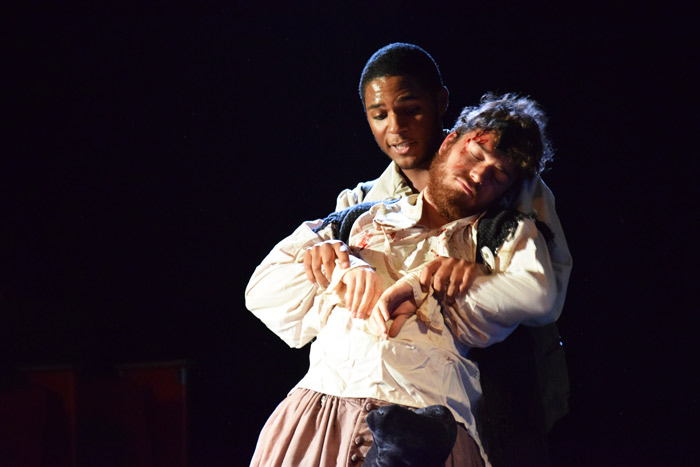History is a black box where nobody in the present can ever really know what happened in the past. Lies become truth through force of attrition, and truths are lost forever to the erosion of records. This unsteady ground is the foundation of Chocolate Moose Theatre Company’s production of Conspiracy!, a play that spins its themes of ambiguity into the realm of paranoid absurdity.
Written by Co-Director Martin Law, the play follows two siblings: The uptight, perpetually-worried Richard (Dakota Wellman), and the headstrong Jane (Alexandra Petrachuk), who has just been released from prison on a treason sentence. They end up in front of Queen Elizabeth I, who tasks them with faking the murder of famous playwright Christopher Marlowe for reasons that are never made entirely clear. What follows is a deceptively shaggy series of humourous incidents that seem designed more to pit clashing personalities against each other in comedic ways than to advance the plot. But in a fashion typical of Elizabethan theatre, multiple plotlines converge in the final act. Soon it becomes apparent that the play has been carefully laying the groundwork for several layers of revelation to occur.
[URIS id=42570]
The play seems to come to a poignant resolution about the power of creating a false historical narrative. It then completely eschews any sense of resolution, settling on a defiantly anachronistic ending that is as terrifying as it is hilarious. Just as the characters have been fooled by each other in various ways throughout the play, the biggest trick turns out to have been played on the audience.
Despite the fact that the script could have easily been 20 minutes shorter, it maintains a consistent level of energy throughout, rapidly tossing off Shakespearean wordplay and making pithy observations about the era in a way that leans on the fourth wall without pushing it over. What’s perhaps most impressive is how well it draws Christopher Marlowe (Kenny Streule)—a historical figure who has been accused of being everything from a spy to a warlock to the real author of Shakespeare’s plays—as a collection of the myths that surround him rather than settle on one simple interpretation. The result is a character who literalizes the themes of the play in a way that both creates a complex character and brings an extra level of focus to the production.
The acting is top-to-bottom fantastic with the caveat that some performances relish a little too much in their broad loudness. Every single put-on British or Scottish accent is delivered believably, with some actors playing multiple dialects, which is an anomaly in today’s Montreal theatre scene. The Bull siblings have believable chemistry and manage to keep the cast grounded amidst the boorish anarchy of Marlowe. Particular standouts in the supporting cast include Katherine Turnbull as a delightfully unhinged Scottish militant, and Harry Burton as a servile attendant to the Queen. In an inspired casting choice, almost all actors play double roles which invites a number of fun parallels that can be drawn, and contributes to the play’s general atmosphere of paranoia.
Law and Hannah Kirby (who also directed Players’ Theatre’s excellent Round Dance last year) are able to convey a lot despite their limited space and minimal set dressings. The set is very simple—a table, some chairs, and some black wooden boxes make up almost the entirety of the props. But they’re mixed into an endless number of imaginative permutations—for instance, some boxes and a lighting filter are enough to make a convincing moonlight burial scene. Scenes of bloodshed are usually preceded by the stage gradually becoming cast in red light, contributing to the play’s tone of heightened reality.
The lack of a direct tether to an objective historical truth could alienate some more traditional viewers, but the play makes the point that such a thing never existed in the first place. When Napoleon said that “history is a lie agreed upon,” this is probably not what he meant, but also, it kind of is.








